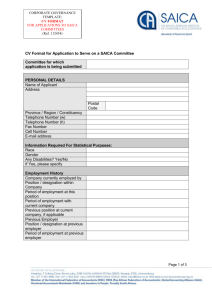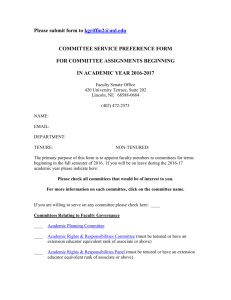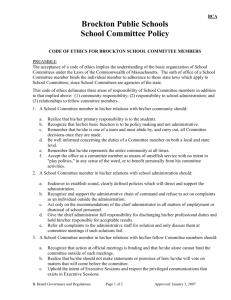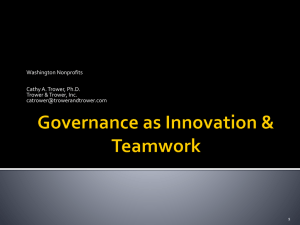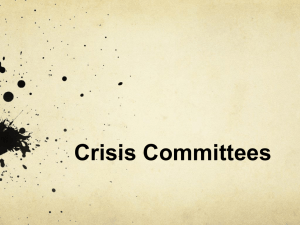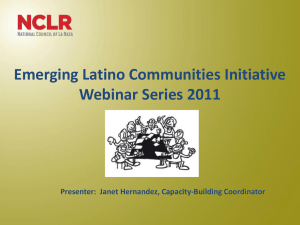Effective Committees - Professionals Australia
advertisement
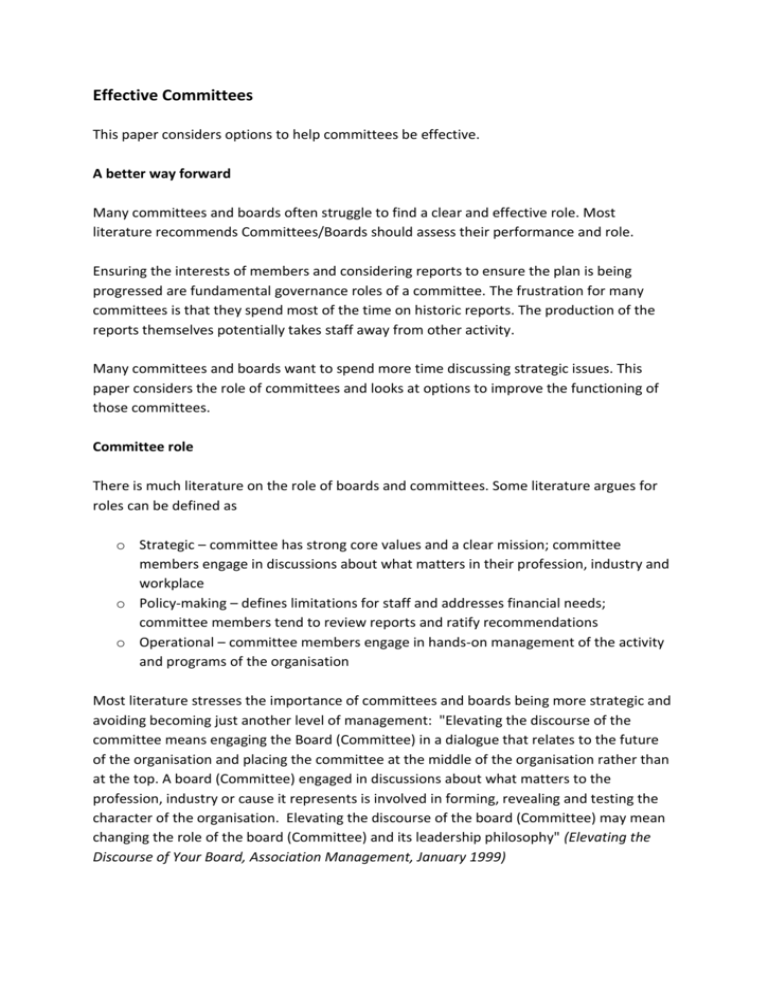
Effective Committees This paper considers options to help committees be effective. A better way forward Many committees and boards often struggle to find a clear and effective role. Most literature recommends Committees/Boards should assess their performance and role. Ensuring the interests of members and considering reports to ensure the plan is being progressed are fundamental governance roles of a committee. The frustration for many committees is that they spend most of the time on historic reports. The production of the reports themselves potentially takes staff away from other activity. Many committees and boards want to spend more time discussing strategic issues. This paper considers the role of committees and looks at options to improve the functioning of those committees. Committee role There is much literature on the role of boards and committees. Some literature argues for roles can be defined as o Strategic – committee has strong core values and a clear mission; committee members engage in discussions about what matters in their profession, industry and workplace o Policy-making – defines limitations for staff and addresses financial needs; committee members tend to review reports and ratify recommendations o Operational – committee members engage in hands-on management of the activity and programs of the organisation Most literature stresses the importance of committees and boards being more strategic and avoiding becoming just another level of management: "Elevating the discourse of the committee means engaging the Board (Committee) in a dialogue that relates to the future of the organisation and placing the committee at the middle of the organisation rather than at the top. A board (Committee) engaged in discussions about what matters to the profession, industry or cause it represents is involved in forming, revealing and testing the character of the organisation. Elevating the discourse of the board (Committee) may mean changing the role of the board (Committee) and its leadership philosophy" (Elevating the Discourse of Your Board, Association Management, January 1999) As the owners of the organisation, elected leadership provide direction and oversight. If the members are the owners of this association, they depend on their committees to be their voice. Unless roles are clear and agreed, difficulties can arise. For starters, the purpose of meetings and content of meetings will be obscure without clarity around roles. Operational versus governance Before we get lost in the jargon and separation of operational and governance roles, above all else it is important to remember our reason for being and values as outlined in our mission, vision, guiding principles/values and goals (see Strategic Plan). The Association is owned and directed by members. The staff act with delegated authority. The organisation does not work effectively without the active involvement of members and with motivated, engage, capable staff. "We traditionally treat governing bodies as management one step removed – sort of like a management oversight committee. Perhaps the greatest impediment to conceptual development of governance is that boards and their CEOs conceive of the Board's role as an extension upwards of management rather than an extension downwards of ownership. They come to believe that their primary role is to help managers manage. Consequently, they examine management in great detail, review management plans, etc. This myth leads to an assumption that the board made up of good managers is a good board. But rather than improving the quality of governance, managers on boards frequently lead a board further in the micromanagement than it otherwise would have gone. While individual board members can certainly lend their skills and insight to management as operational volunteers, the job of the Board as a body is not to help manage, but in a Trustees sense, to own the business on behalf of members" (Reinventing Governance, Association Management, August 1999) Roles Some important roles of a committee can include: Planning – As outlined in the planning cycle, it is critical committees having input into the strategic direction and ensure plans exist. Reporting – It is important to understand progress against plan objectives. Finances – With central financing, committees have a limited role controlling their budget. Strategy – Assessing our context and environment and discussing future directions. Leading by doing – Many committee members are active beyond thinking and talking. As the owners of the organisation, elected leadership provide direction and oversight. Beyond governance, elected leadership take on volunteer roles to help drive and implement plans. When the leadership takes on the volunteer role they do this in collaboration with other volunteers and staff to get the job done. This is strictly not a governance role, but is essential the effective progress of the Association. Renewal – Committees have a key role in ensuring succession and renewal. Professional development is a legitimate activity for a committee. Context and Environment – It is essential the organisations understand its context and environment and focus on key issues facing the profession and industries. Committee members are able to bring their contemporary understanding of their workplaces, industries and professions to meetings. Relationship with staff It is critical committees, in particular Presidents, have a constructive relationship with Directors and Executive Officers. Ideally Presidents and Directors/Executive Officers talk regularly and Presidents ensure staff maximise time doing rather than reporting or doing administrative work for the committee. Staff should respect the governance role of committees and have an open relationship. A tension can exists where staff are employed by the CEO who in turn is responsible to the National Board (who are responsible to National Assembly). The CEO allocates staff resources to state and national offices. Committees are responsible for the components of the plan applicable in their division or area. Making Committees work “The key isn’t structural, it’s social. The most involved, diligent, evaluating boards (committees) may or may not follow every recommendation in the good governance handbook. What distinguishes exemplary boards (committees) is that they are robust, effective social systems” Australian Institute of Company Directors Great boards and committees have: Clarity and strength of purpose; The right people, right behaviours and right culture; Processes that productively harness the energy and capability. Good group dynamic is essential. There is much discussion about the role of the boards. In utilising the following quote, the word ‘board’ has been changed to ‘committee’ and ‘company’ to ‘Association’: “Effective committee leadership requires firstly, a clear understanding of the role of the Association towards the achievement of its objectives. This in turn requires an understanding of the objectives of the Association, how the Association achieves these, and the respective roles of the committee and the management team in achieving them. Leadership also requires an understanding of the contribution of each committee member to the leadership of the committee.” “Leadership and behaviour cannot be separated. Behaviour is demonstrated between committee members, and within the committee as a whole, greatly impact the committee’s ability to help the organization achieve its objectives.” “Individual committee members need to be aware of their behaviours, how they interact to other committee members and how their behaviour impacts the committee as a whole” Australian Institute of Company Directors Model Agenda One commentator noted a recipe for agendas that looks like this: one third oversight – including reports on progress of the plan; one third insight – including current strategic issues and opportunities such as decisions on new or revised programs and services and public policy positions; one third foresight – including identifying and discussing emerging trends and issues and implications for your industry, profession or cause and for your Association strategic direction. A draft agenda is included in this handbook that can encourage committees to have a greater focus on insight and foresight.


